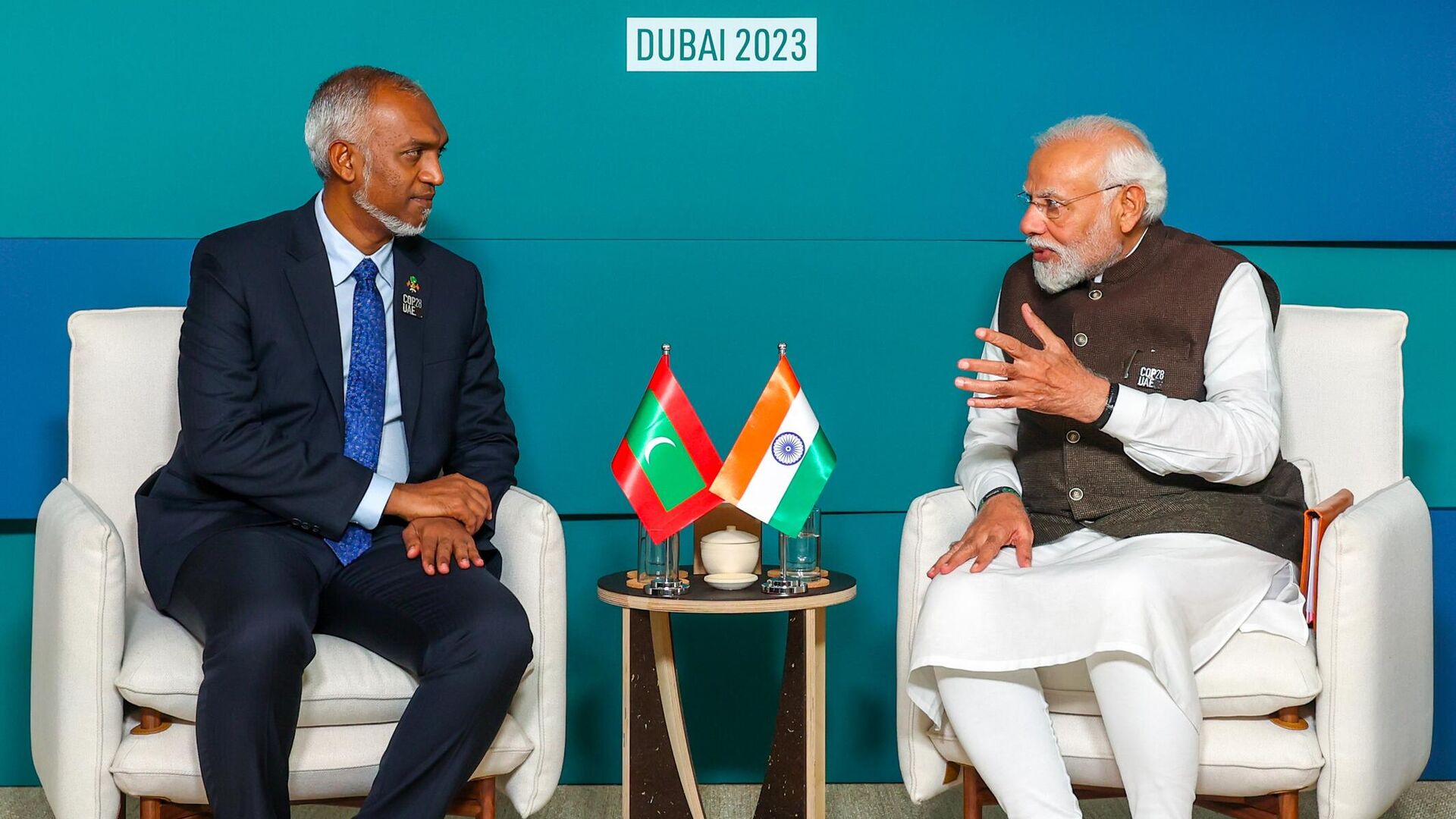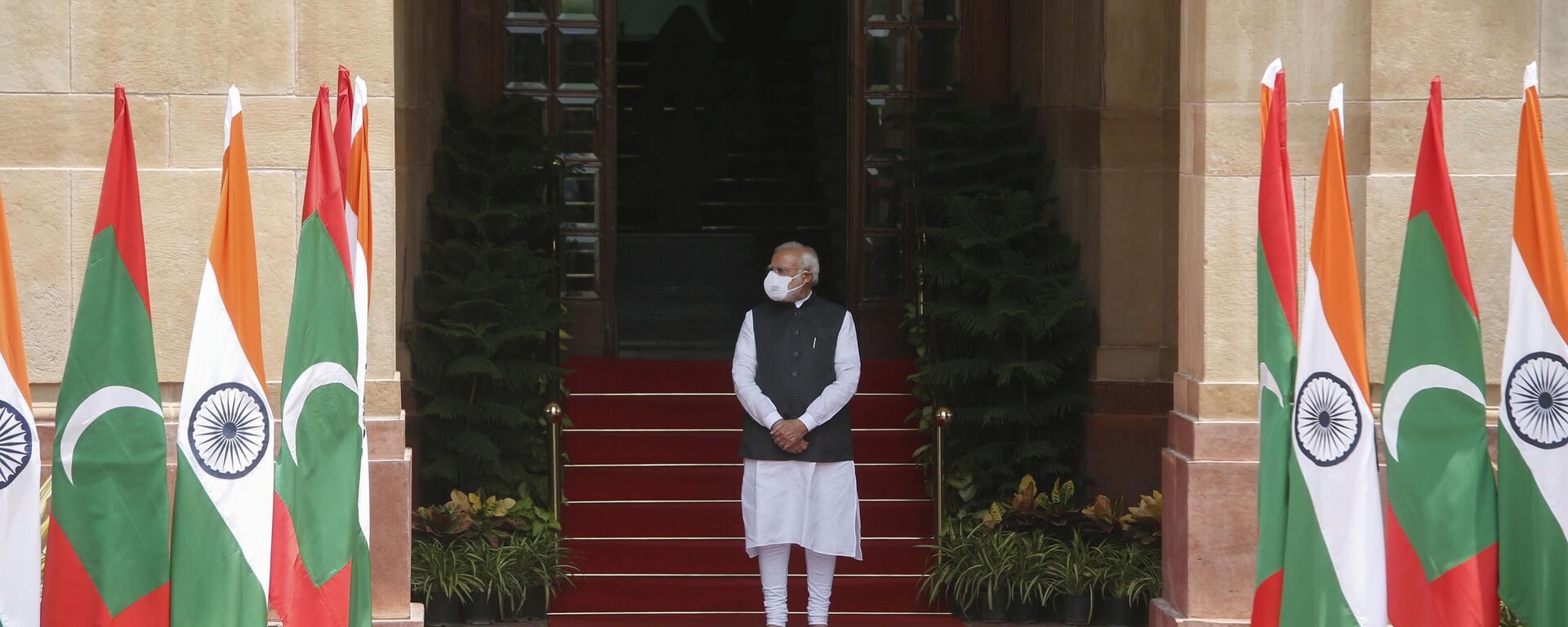https://sputniknews.in/20240422/what-does-victory-of-muizzus-party-in-elections-in-maldives-means-for-india-7195131.html
What Does Victory of Muizzu’s Party in Elections in Maldives Means for India?
What Does Victory of Muizzu’s Party in Elections in Maldives Means for India?
Sputnik India
The ties between India and Maldives deteriorated after three Maldivian ministers made derogatory remarks against Indian Prime Minister Narendra Modi.
2024-04-22T20:39+0530
2024-04-22T20:39+0530
2024-04-22T20:39+0530
sputnik opinion
india
maldives
diplomatic row
multilateral diplomacy
narendra modi
indian ocean
china
tourism
mohamed muizzu
https://cdn1.img.sputniknews.in/img/07e7/0c/02/5673746_0:424:2131:1623_1920x0_80_0_0_d67f9759256b47810b4839341adb0008.jpg
Maldives president Mohamed Muizzu’s People’s National Congress (PNC) secured a landsliding victory in the island country’s parliamentary election held on Sunday.The PNC has won nearly 70 out of total 93 seats in Maldivian parliament Majlis thus securing a two-third majority in the house. The party had fielded 90 contestants.The thumping victory in the elections will give President Muizzu to push his policies through the parliament.However, the Maldivian election results are being closely monitored by India as the relations between both the countries have been strained from past few months.India-Out Campaign Likely to ContinueAfter Muizzu was elected as the President of Maldives last year, he had said that Maldives wants to maintain good relations with all the countries including China and India. However, three deputy Maldivian ministers made derogatory remarks against Prime Minister Narendra Modi which triggered a diplomatic row between the two countries.Muizzu suspended the three ministers but weeks after the incident asked India to withdraw its troops from the island nation.Later, he called China as “one of the closest allies and developmental partners of the Maldives”. It was the first time that any Maldivian president skipped India as the first port of call.The insistence of Muizzu on withdrawal of India troops further strained the ties between the two countries.Talking about Muizzu’s “India-Out” campaign, Sanjay Kumar Pandey, Professor at School of International Studies, Jawaharlal Nehru University told Sputnik India that this campaign is likely to continue however it is too early to predict anything.He further stated that earlier the opposition party had a majority in parliament and therefore, he couldn’t take many of the steps that he wanted but now that he has two thirds plus majority so, he can easily carry out the policy that he intends to and some of this will not be positive for India.He, however, also said that in the last few months it has been seen that President Muizzu is making some noises which imply that perhaps he wants good relations with India.Prospects of Normalisation in Diplomatic Ties With MaldivesSharing his thoughts about prospects of normalisation in diplomatic ties with Maldives, the professor said that there is some realisation in President Muizzu’s government that alienating India will not be in their interest.Professor Pandey further said that after realising this there were some statements by the President and some other ministers intending to somehow placate India.He also believes that India has also taken a very mature and restrained position on the matter.Regional Options for India to Replace MaldivesTalking about the other regional options for India to replace Maldives if relations are not normalised, Professor Pandey said that Mauritius is one of the options and then India has its own string of islands on both sides of its peninsular – Andman & Nicobar Island and Lakshdweep Island.Stating that there is no reason for alarm as India has other countries in the Indian Ocean region and other initiatives which will stand in good state.He also believes that Indian government is fully cognisant or aware of the delicate situation, it doesn't want to antagonise Maldives rather wants to send positive signals to it but there are cases obviously and India is well prepared to handle them.“However, diplomacy requires a very balance and mature way in dealing with neighbours especially smaller ones and those in the Indian Ocean region which acquire greater significance in China's foreign policy and trade. So, we have to tread very cautiously,” he concluded.
https://sputniknews.in/20240111/who-benefits-from-india-maldives-row-6164108.html
india
maldives
indian ocean
china
Sputnik India
feedback.hindi@sputniknews.com
+74956456601
MIA „Rossiya Segodnya“
2024
Rahul Trivedi
https://cdn1.img.sputniknews.in/img/07e6/0c/13/136500_0:0:628:627_100x100_80_0_0_72097ff894c7446b70d2efafcb719720.jpg
Rahul Trivedi
https://cdn1.img.sputniknews.in/img/07e6/0c/13/136500_0:0:628:627_100x100_80_0_0_72097ff894c7446b70d2efafcb719720.jpg
News
en_IN
Sputnik India
feedback.hindi@sputniknews.com
+74956456601
MIA „Rossiya Segodnya“
Sputnik India
feedback.hindi@sputniknews.com
+74956456601
MIA „Rossiya Segodnya“
Rahul Trivedi
https://cdn1.img.sputniknews.in/img/07e6/0c/13/136500_0:0:628:627_100x100_80_0_0_72097ff894c7446b70d2efafcb719720.jpg
maldives president mohamed muizzu, people’s national congress, muizzu's party wins maldives parliamentary election, maldivian parliament majlis, maldives' india-out campaign, diplomatic row between india and maldives, school of international studies, jawaharlal nehru university, normalisation of india-maldives relations, andman & nicobar island, lakshdweep, indian ocean region, relation between india and maldives
maldives president mohamed muizzu, people’s national congress, muizzu's party wins maldives parliamentary election, maldivian parliament majlis, maldives' india-out campaign, diplomatic row between india and maldives, school of international studies, jawaharlal nehru university, normalisation of india-maldives relations, andman & nicobar island, lakshdweep, indian ocean region, relation between india and maldives
What Does Victory of Muizzu’s Party in Elections in Maldives Means for India?
The ties between India and Maldives deteriorated after three Maldivian ministers made derogatory remarks against Indian Prime Minister Narendra Modi.
Maldives president Mohamed Muizzu’s People’s National Congress (PNC) secured a landsliding victory in the island country’s parliamentary election held on Sunday.
The PNC has won nearly 70 out of total 93 seats in Maldivian parliament Majlis thus securing a two-third majority in the house. The party had fielded 90 contestants.
The thumping victory in the elections will give President Muizzu to push his policies through the parliament.
However, the Maldivian election results are being closely monitored by India as the relations between both the countries have been strained from past few months.
India-Out Campaign Likely to Continue
After Muizzu was elected as the
President of Maldives last year, he had said that Maldives wants to maintain good relations with all the countries including China and India. However, three deputy Maldivian ministers made derogatory remarks against Prime Minister Narendra Modi which triggered a diplomatic row between the two countries.
Muizzu suspended the three ministers but weeks after the incident asked India to withdraw its troops from the island nation.
Later, he called China as “one of the closest allies and developmental partners of the Maldives”. It was the first time that any Maldivian president skipped India as the first port of call.
The insistence of Muizzu on withdrawal of India troops further strained the ties between the two countries.
Talking about Muizzu’s “India-Out” campaign, Sanjay Kumar Pandey, Professor at School of International Studies, Jawaharlal Nehru University told Sputnik India that this campaign is likely to continue however it is too early to predict anything.
“As of now, the issue seems to be complex but Muizzu’s attempts to move closer to China and to distance from India will continue,” Pandey said.
He further stated that earlier the opposition party had a majority in parliament and therefore, he couldn’t take many of the steps that he wanted but now that he has two thirds plus majority so, he can easily carry out the policy that he intends to and some of this will not be positive for India.
He, however, also said that in the last few months it has been seen that President Muizzu is making some noises which imply that perhaps he wants good relations with India.
Prospects of Normalisation in Diplomatic Ties With Maldives
Sharing his thoughts about prospects of normalisation in
diplomatic ties with Maldives, the professor said that there is some realisation in President Muizzu’s government that alienating India will not be in their interest.
“They owe about $400 million of loan and also a large part of the tourism industry runs because of Indian tourists. In the last few months, there is a significant drop in the number of Indian tourists going to Maldives. Therefore, there is a realisation that perhaps this is not good for the economy and especially for the tourism industry,” he said.
Professor Pandey further said that after realising this there were some statements by the President and some other ministers intending to somehow placate India.
He also believes that India has also taken a very mature and restrained position on the matter.
“Foreign Minister S. Jaishankar said that history and geography cannot be changed and that connects us to Maldives and therefore, on both sides, there is the realisation that there is a need to work together and not to allow the relationship to deteriorate any further,” the JNU professor stated.
Regional Options for India to Replace Maldives
Talking about the other regional options for India to replace Maldives if relations are not normalised, Professor Pandey said that
Mauritius is one of the options and then India has its own string of islands on both sides of its peninsular – Andman & Nicobar Island and Lakshdweep Island.
“We have positions which will be useful and there is an attempt at naval build-up in Andman & Nicobar as well as Lakshdweep. First and foremost this is India’s own territory and most important line of defense,” he said.
Stating that there is no reason for alarm as India has other countries in the Indian Ocean region and other initiatives which will stand in good state.
He also believes that Indian government is fully cognisant or aware of the delicate situation, it doesn't want to antagonise Maldives rather wants to send positive signals to it but there are cases obviously and India is well prepared to handle them.
“However, diplomacy requires a very balance and mature way in dealing with neighbours especially smaller ones and those in the Indian Ocean region which acquire greater significance in China's foreign policy and trade. So, we have to tread very cautiously,” he concluded.



